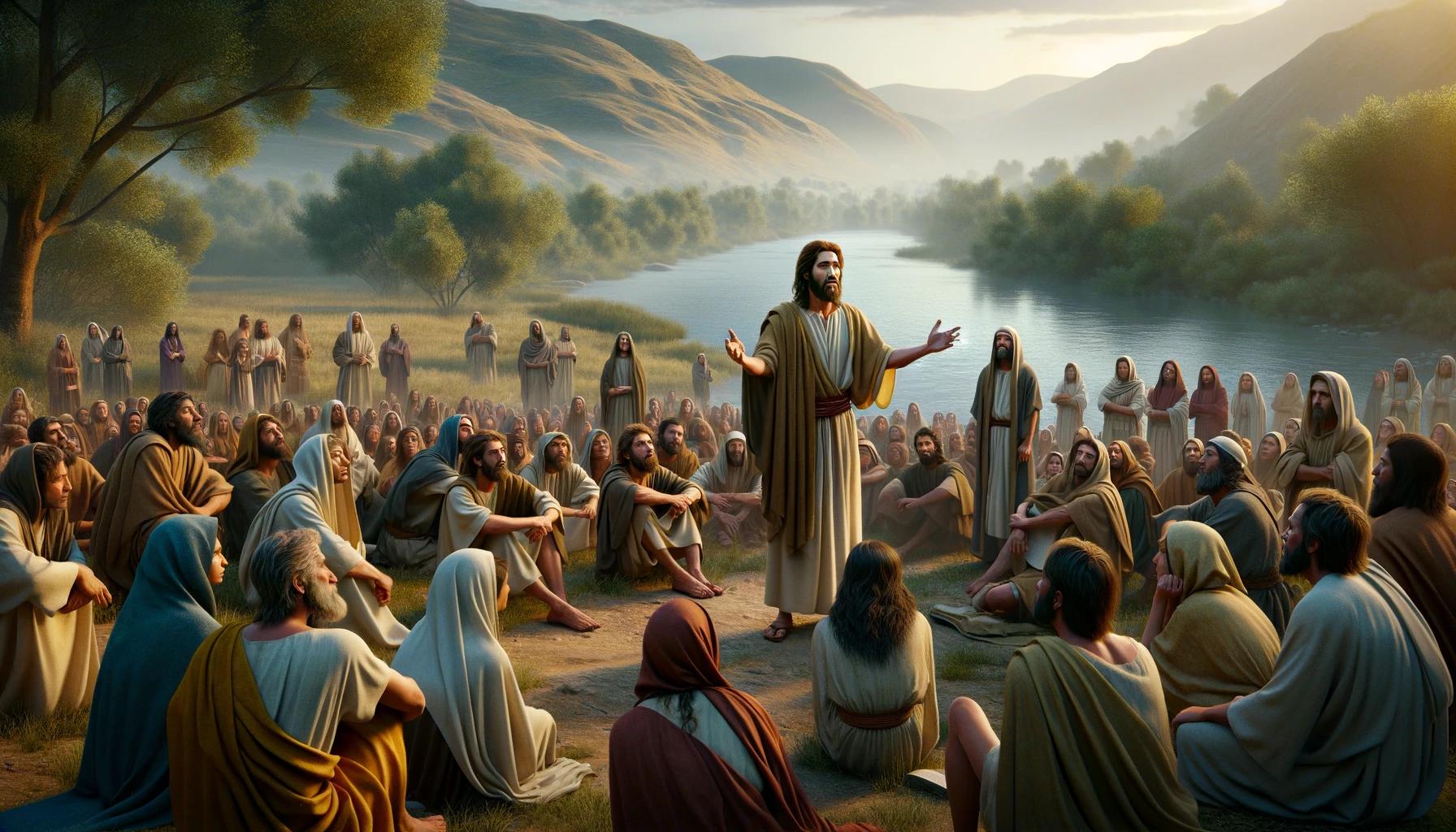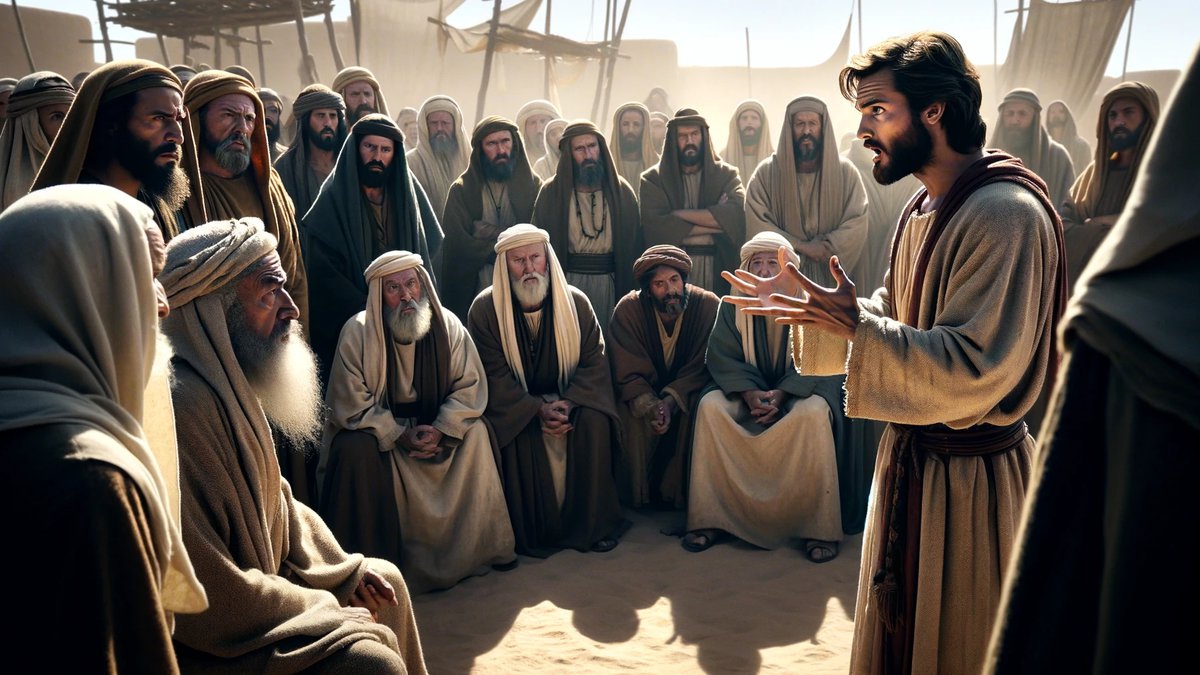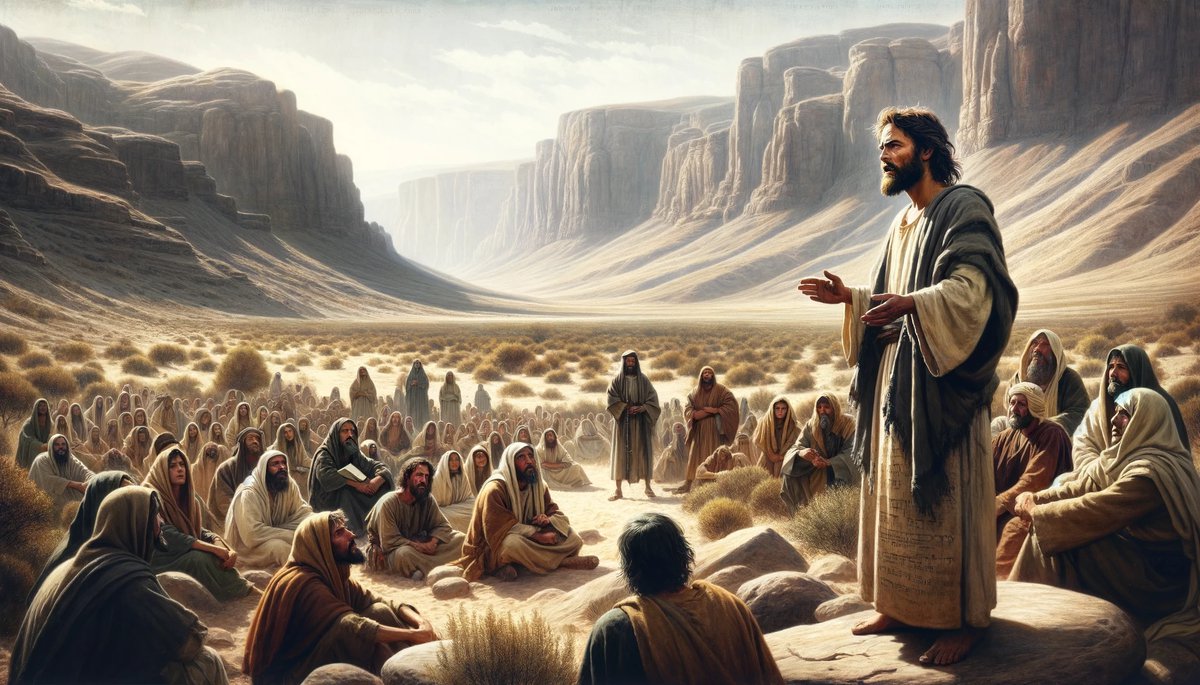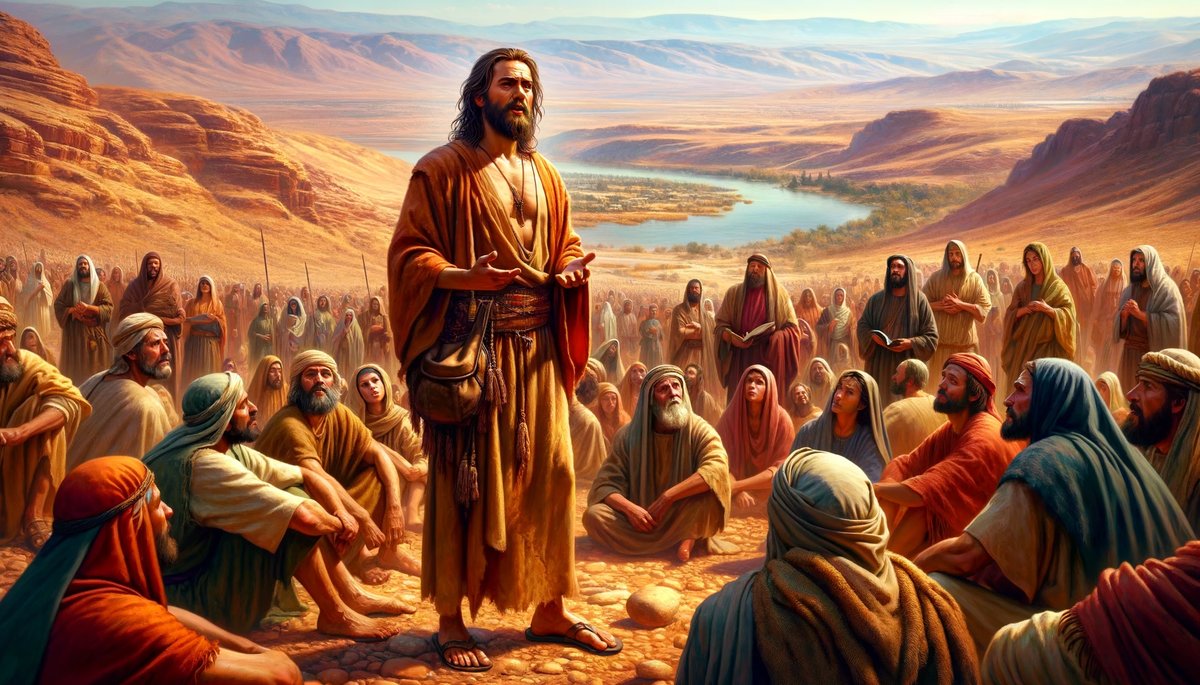Home>Theology and Spirituality>What Year Did John The Baptist Began His Ministry


Theology and Spirituality
What Year Did John The Baptist Began His Ministry
Published: February 23, 2024
Ericka Andersen, an editor at Christian.net, expertly merges digital strategy with content creation, focusing on faith and societal issues. Her communication skills enhance the platform's engaging narratives, fostering meaningful dialogue on belief's impact on society.
Discover the significance of the year when John the Baptist commenced his ministry in this insightful theology and spirituality exploration. Uncover the historical context and spiritual implications.
(Many of the links in this article redirect to a specific reviewed product. Your purchase of these products through affiliate links helps to generate commission for Christian.net, at no extra cost. Learn more)
Table of Contents
Introduction
The story of John the Baptist is a compelling and pivotal aspect of Christian theology and spirituality. His life and ministry are intricately woven into the fabric of the New Testament, and his influence reverberates throughout the ages. John the Baptist is known for his role as the herald of Jesus Christ, preparing the way for the Messiah through his preaching and baptism.
The narrative of John the Baptist begins with his miraculous birth to elderly parents, Zechariah and Elizabeth. This event, foretold by the angel Gabriel, signified the fulfillment of divine prophecy and marked the inception of a remarkable life destined to impact the course of history. John's birth was a testament to the power of faith and divine intervention, as his parents had long been considered beyond the age of childbearing.
As John the Baptist grew, he embraced a life of asceticism and spiritual devotion, dwelling in the wilderness and subsisting on a diet of locusts and wild honey. His austere lifestyle mirrored his unwavering commitment to his divine calling and set the stage for the profound impact he would have on the religious landscape of his time.
John's ministry was characterized by a fervent call to repentance and a baptism of purification, symbolizing a spiritual rebirth and readiness for the imminent arrival of the Messiah. Multitudes flocked to the banks of the Jordan River to heed his message, drawn by the authenticity and power of his proclamation.
The enigmatic figure of John the Baptist continues to captivate the hearts and minds of believers and scholars alike, prompting profound reflection on the significance of his role in the grand narrative of salvation history. His unwavering dedication to his mission, coupled with his humility and selflessness, serves as a timeless example of steadfast faith and obedience to divine purpose.
In the subsequent sections of this article, we will delve deeper into the extraordinary life and ministry of John the Baptist, exploring the pivotal moments that defined his legacy and examining the profound impact of his proclamation on the spiritual landscape of his era. Join us on this enlightening journey as we unravel the timeless truths encapsulated in the narrative of John the Baptist.
The Birth of John the Baptist
The birth of John the Baptist is a testament to the miraculous workings of divine providence and the fulfillment of ancient prophecies. According to the Gospel of Luke, John's parents, Zechariah and Elizabeth, were devout and righteous individuals who had longed for a child but were unable to conceive due to Elizabeth's advanced age. However, their fervent prayers were answered in a remarkable and unexpected manner.
The angel Gabriel appeared to Zechariah while he was performing his priestly duties in the temple, announcing that his prayers had been heard and that Elizabeth would bear a son. Overwhelmed by disbelief, Zechariah questioned the angel's proclamation, prompting Gabriel to render him mute until the fulfillment of the prophecy. True to the angel's words, Elizabeth conceived and rejoiced in the miraculous gift of pregnancy.
The extraordinary nature of John's conception and birth was further underscored by the angel's declaration that he would be filled with the Holy Spirit from the womb and would play a significant role in preparing the hearts of the people for the arrival of the Messiah. This divine commission set John apart as a chosen vessel, destined to herald the dawn of a new era in the redemptive plan of God.
The birth of John the Baptist, heralded by the joyous proclamation of his relatives and neighbors, signified the dawn of a new hope and the fulfillment of God's promise to his people. The miraculous nature of his conception and the profound significance of his destiny served as a prelude to the extraordinary life and ministry that awaited him.
John's birth not only brought immeasurable joy to his parents but also foreshadowed the dawn of a transformative era in the history of salvation. His very existence bore witness to the faithfulness and power of God, igniting a sense of anticipation and wonder among those who beheld the unfolding of this remarkable narrative.
The birth of John the Baptist stands as a testament to the timeless truth that nothing is impossible with God. It serves as a poignant reminder that divine promises are fulfilled in ways that surpass human understanding, and that the unfolding of God's redemptive plan often defies conventional expectations. The miraculous birth of John the Baptist set the stage for the extraordinary ministry that would unfold in the years to come, leaving an indelible mark on the tapestry of sacred history.
The Ministry of John the Baptist
The ministry of John the Baptist stands as a profound testament to his unwavering commitment to his divine calling and the transformative impact of his message on the hearts and lives of those who encountered him. Emerging from the wilderness with a fervent zeal and uncompromising dedication, John embarked on a mission that would reverberate throughout the annals of history.
John's ministry was characterized by a resounding call to repentance and a baptism of purification, symbolizing a spiritual rebirth and readiness for the imminent arrival of the Messiah. His impassioned exhortations echoed across the Judean landscape, drawing multitudes to the banks of the Jordan River, where he proclaimed the coming of the long-awaited Redeemer.
The authenticity and power of John's message resonated deeply with the people, transcending social barriers and stirring the hearts of individuals from all walks of life. His uncompromising stance against religious hypocrisy and moral complacency challenged the prevailing norms of his time, igniting a fervor for spiritual renewal and a longing for genuine transformation.
John's ministry also bore the hallmark of humility and selflessness, as he unequivocally declared that he was not the Christ but rather the one who prepared the way for the Messiah. His profound humility and unwavering commitment to his role as the forerunner of Jesus Christ exemplified the essence of servanthood and self-effacement, setting an enduring example for all who seek to align themselves with the divine purpose.
The impact of John's ministry extended far beyond the confines of his immediate surroundings, reaching the ears of religious leaders and ordinary individuals alike. His message transcended the boundaries of conventionality, challenging the status quo and beckoning the hearts of the people to embrace a radical transformation of their innermost being.
The ministry of John the Baptist serves as a timeless reminder of the power of authentic proclamation and the enduring relevance of a message rooted in divine truth. His unwavering commitment to his calling, coupled with his humility and selflessness, continues to inspire and challenge individuals to embrace a life of wholehearted devotion to the divine purpose.
In the subsequent sections of this article, we will delve deeper into the pivotal moments that defined John the Baptist's legacy and examine the profound impact of his proclamation on the spiritual landscape of his era. Join us on this enlightening journey as we unravel the timeless truths encapsulated in the narrative of John the Baptist.
The Year John the Baptist Began His Ministry
The precise year in which John the Baptist commenced his ministry holds significant theological and historical importance, as it marks the initiation of a transformative era in the narrative of salvation history. While the exact date of the commencement of John's ministry is not explicitly stated in the New Testament, scholarly consensus and historical context provide valuable insights into the probable timeframe of this pivotal event.
The Gospel of Luke provides a crucial chronological reference point by situating the emergence of John the Baptist's ministry within the reign of Tiberius Caesar, Pontius Pilate being governor of Judea, Herod being tetrarch of Galilee, and his brother Philip tetrarch of the region of Ituraea and Trachonitis, and Lysanias tetrarch of Abilene, during the high priesthood of Annas and Caiaphas. This detailed historical framework offers valuable clues for establishing the approximate timeframe of John's ministry.
Scholars and historians have meticulously examined the reigns of the aforementioned rulers and the tenures of the high priests to ascertain the probable year in which John the Baptist commenced his prophetic ministry. Based on these historical markers and the correlation with the ministry of Jesus Christ, it is widely believed that John began his public proclamation and baptism in the early 20s AD.
The convergence of historical data, biblical accounts, and extra-biblical sources provides a compelling foundation for situating the commencement of John the Baptist's ministry within the broader socio-political and religious landscape of the 1st century AD. This timeframe aligns with the unfolding of pivotal events in the ministry of Jesus Christ, thereby establishing a cohesive historical and theological framework for understanding the interconnectedness of their respective missions.
The commencement of John the Baptist's ministry heralded a profound shift in the spiritual climate of Judea, igniting a fervor for repentance and spiritual renewal among the people. His impassioned proclamation and baptism of repentance set the stage for the imminent arrival of the Messiah, preparing hearts and minds for the transformative message and redemptive work of Jesus Christ.
The year in which John the Baptist began his ministry serves as a pivotal juncture in the grand narrative of salvation, signaling the dawn of a new era characterized by the fulfillment of ancient prophecies and the manifestation of God's redemptive plan. The convergence of historical, biblical, and theological dimensions underscores the profound significance of this momentous event, inviting contemplation and reverence for the divine orchestration of human history.
As we reflect on the commencement of John the Baptist's ministry, we are reminded of the timeless truth that God's appointed times unfold within the tapestry of human chronology, shaping the course of human destiny and ushering in the fulfillment of divine promises. The year in which John embarked on his prophetic mission stands as a testament to the intricate interplay of human history and divine providence, inviting us to ponder the profound implications of this transformative epoch in the unfolding drama of redemption.
Conclusion
The narrative of John the Baptist encapsulates a tapestry of divine intervention, prophetic fulfillment, and unwavering commitment to a transcendent calling. From the miraculous circumstances surrounding his birth to the resounding impact of his ministry, John the Baptist emerges as a central figure in the grand narrative of salvation history. His life and proclamation serve as a bridge between the prophetic anticipation of the Old Testament and the fulfillment of God's redemptive plan in the person of Jesus Christ.
The birth of John the Baptist, heralded by the angelic announcement and celebrated as a testament to the faithfulness of God, set the stage for the extraordinary destiny that awaited him. His emergence as the forerunner of the Messiah, marked by a life of ascetic devotion and unwavering dedication to his divine commission, exemplifies the timeless truth that God equips and empowers individuals for extraordinary purposes.
The ministry of John the Baptist reverberates with a resounding call to repentance, spiritual renewal, and the anticipation of the imminent arrival of the Messiah. His baptism of purification symbolized a profound readiness for the transformative message and redemptive work of Jesus Christ, igniting a fervor for spiritual awakening and a longing for genuine transformation.
The commencement of John the Baptist's ministry, situated within the broader historical and theological context of the 1st century AD, serves as a pivotal juncture in the unfolding drama of redemption. The convergence of historical markers and biblical accounts underscores the interconnectedness of John's mission with the redemptive narrative, inviting contemplation on the intricate interplay of human history and divine providence.
In conclusion, the narrative of John the Baptist stands as a timeless testament to the profound impact of a life wholly surrendered to the divine purpose. His birth, ministry, and the commencement of his prophetic proclamation collectively bear witness to the overarching sovereignty of God in orchestrating the fulfillment of His redemptive plan. As we reflect on the extraordinary life and ministry of John the Baptist, we are invited to embrace the enduring truths encapsulated in his narrative and to align ourselves with the transformative message of repentance, spiritual renewal, and the anticipation of the redemptive work of Jesus Christ.















